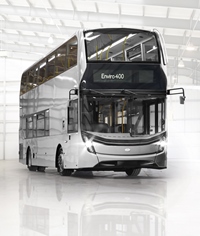
The £25.5m fleet will replace a quarter of the NCT fleet, with the operator looking to have its entire fleet composed of Euro 5+ or gas buses by 2020
Nottingham City Transport (NCT) has applied for a £6.5m grant from the Office for Low Emission Vehicles (OLEV) Low Emission Bus Scheme to complement a £19m investment in order to introduce 82 bio-gas double-deckers to the operator’s fleet over three years from October 2016.
The funding decision will be made by OLEV in January 2016, with the first Alexander Dennis (ADL) bodied Scania gas buses on the road by the following October.
“Gas buses have much less of an impact on the environment compared to the diesel buses we would normally buy,” said Nottingham City Transport Marketing Manager, Anthony Carver-Smith.
“Nitrogen Oxides are lower, as are the sooty particulates emitted, and as we will be using bio-gas, the carbon footprint is incredibly low.
“This really is a fantastic project that will support the wider efforts and investment made by Nottingham City Council to introduce low emission vehicles to the city.”
DEFRA – The Department for Environment, Food and Rural Affairs – recommended that the Nottingham Urban Area needed to consider low emission zones and vehicles to reduce emissions and improve air quality. The introduction of the bio-gas buses is targeted at supporting these aims, building on the electric buses, the tram and the City Council’s ambitions to introduce electric taxis and new charging points for electric cars.
Cllr Nick McDonald, Nottingham City Council’s Portfolio Holder for Jobs, Growth and Transport, said: “The City Council and NCT are very excited about this low carbon bus service proposal.
“It shows our combined ambition to deliver greener and cleaner transport for Nottingham. It will complement our other bids for funding to deliver electric vehicle charging infrastructure and electric taxis, which will improve Nottingham’s air quality, reduce carbon emissions and make the city environment more attractive for residents, businesses and visitors.”
OLEV is a team working across Government to support the early market for Ultra-Low Emission Vehicles (ULEVs). It is providing over £900m with the aim to position the UK at the forefront of ULEV development, manufacture and use.
If approved, the £6.5m NCT has applied for will contribute towards the cost of each bus and the infrastructure cost of installing gas fuelling facilities at NCT’s Parliament Street Garage.
“The new gas buses are likely to be the very first gas double-deckers in the UK, which is hugely exciting,” added Anthony Carver-Smith.
“They’ll be ADL-bodied Scania buses, so they’ll be of the highest quality and using gas buses will enable our customers to reach the heart of the City on one of the cleanest modes of transport available”.
The Scania chassis for each bus will be assembled in Leyland in Lancashire ahead of the bodying by ADL. Nottingham-based company, Roadgas in Colwick, will supply the infrastructure.
The £25.5m project will replace a quarter of NCT’s current fleet. By 2020, NCT is aiming for every bus to have either a Euro 5 engine or gas-powered engine, creating one of the lowest-emission fleets in the UK.
A kilogramme of bio-methane gas will be injected into the national gas grid for every kilogramme of gas used by each new bus. As such, the entire operation will also qualify for carbon-neutral status.

